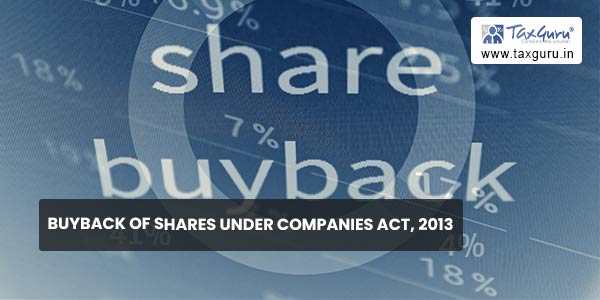Buyback meaning:
Buyback is governed by section 68 of the companies act, 2013, it refers to the purchase by a company of its securities from the marketplace.
Why Buyback?
Occasionally a cash-rich company with excess cash other than working capital prefers to share the cash with the shareholders, rather than keeping it idle in the bank account.
Buyback is a way in which the company can provide returns to its shareholders by sharing the idle cash, and the benefit is generally associated with improved financial ratios, and a reduced number of outstanding shares as well.
Why is reduced number of outstanding shares beneficial for the shareholders?
Following the buyback, as the shareholders have sold the shares back to the company, the shares available in the market are reduced, thereby the ownership stake of the investor increases.
For instance,
| Before buyback | After buyback |
| No. of shares issued = 100 | No. of shares reduced to = 50 |
| A person holding 10 shares has 10% ownership in the company | The ownership of a person holding 10 shares will increase from 10% to 20% post buyback |
How does buyback improve financial ratios?
Buyback reduces the assets on the balance sheet (cash for example) which leads to increased Return on Assets.
Also, reduced outstanding shares result in increased Return on Equity thereby resulting in healthy financials for the company.
Other benefits of Buyback include:
- Strengthen the promoter holding thereby reducing the chances of takeovers
- Boost in share price
- An alternative way of reduction in capital without requiring approval of NCLT( National Company Law Tribunal)
- Provides easy exit for shareholders, etc.
Buyback is controlled by
Section 68– Power of the Company to purchase its Securities
Section 69-Transfer of certain sums to Capital Redemption Reserve (CRR) account.
Section 70– Prohibition for Buyback in certain circumstances
and Rule 17 (Buyback of shares or other Securities) of the Companies Act, 2013.
Legal conditions for Buyback
| 1. | The shares to be bought back shall be fully paid up. |
| 2. | The Buyback may be done by Company’s
(Provided that no buy-back of any kind of shares or other specified securities shall be made out of the proceeds of an earlier issue of the same kind of shares or same kind of other specified securities) |
| 3. | If the shares to be bought back amount to
|
| 4. | The maximum Buyback that can be done in a Financial year is 25%. |
| 5. | The Debt Equity ratio post Buyback shall be 2:1. (The government may by order, notify a higher ratio) |
| 6. | Sources of Buyback:
|
| 7. | Timelines:
|
| 8. | No withdrawal of offer is allowed once it is announced to the shareholders. |
| 9. | The company shall not issue any shares, including bonus issues from the date of passing resolution till the date of closure of buyback, except those arising out of any outstanding convertible instruments. |
| 10. | The company shall not utilize any money borrowed from banks and financial institutions for a buyback. |
Buyback Pre-requisites:

| 1. | Articles of Association shall authorize Buyback |
| 2. | Check restrictions u/s 70 of the Companies Act, 2013. |
| 3. | Check the date of the previous Buyback, as we cannot do more than one buyback within one year of the preceding Buyback. |
| 4. | Decide the % of shares to be bought back, so accordingly we have to pass Board Resolution or Special Resolution. |
| 5. | Prepare offer letter |
| 6. | Decide the Record Date for Share entitlement |
| 7. | Decide the offer period of the Buyback |
| 8. | Calculation of Buyback Price ( Valuation has to be done in case of Private Company) |
| 9. | Calculation of the Buyback needs to be done based on:
Or
|
Buyback Procedure:
| 1. | Convene a meeting of the board of directors and pass a resolution for the proposal of buyback if the % of the buyback is less than 10%
Or If the % of the buyback is up to 25% pass the resolution for convening an Extraordinary general meeting and pass a special resolution in the meeting. As per section 110 read with Rule 22(16)(g), consent of shareholders can also be obtained by the means of a Postal ballot |
| 2. | File MGT-14 within 30 days of passing of Board Resolution/ special resolution as the case may be. |
| 3. | After the passing of the Board Resolution/ special resolution but before the Buyback starts, file with the ROC
|
| 4. | Immediately but not later than 21 days after the filing of SH-8 with ROC, dispatch a letter of offer to the shareholders. |
| 5. | An offer shall be open for a minimum of 15 days and maximum 30days from the date of dispatch of an offer letter |
| 6. | On closing of the offer period, immediately open a separate bank account and deposit the entire sum due |
| 7. | Within 15 days of the end of the offer period, complete the verification of the offer received |
| 8. | Within 7 days of verification,
Or
Shares lodged shall be deemed to be accepted unless a communication of rejection is made within 21 days from the date of closure of the offer |
| 9. | Within 7 days of the last day of completion of buyback, extinguish or physically destroy the shares bought back |
Post Buyback Compliances:
| 1. | Maintain a register of Buyback in SH-10 |
| 2. | Within 30days of completion of buyback:
|
| 3. | If the buyback is done out of free reserves or securities premium, then the amount equal to the nominal value of the shares bought back shall be transferred to the Capital Redemption Reserve (CRR) account, which may be utilized for the issue of fully paid bonus shares. ( Section 69) |
| 4. | Details of the transfer of a certain amount to the CRR account shall be mentioned in the balance sheet. |
Restrictions:
As per section 70, No company shall directly or indirectly purchase its shares
- Through Subsidiary companies or
- An investment company or group of investment companies
- If the company has not complied with provisions of
Sec 92, annual return
Sec 123, declaration of dividend
Sec 127, punishment for failure to distribute dividend
Sec 129, financial statement.
- If there is a default made by the company in
Repayment of deposits accepted, interest payment thereon
Redemption of preference shares or debentures
Payment of dividend to any shareholder
Repayment of any term loan or interest payable to a financial institution or banking company
(Buyback is not prohibited if the default is remedied and 3 years have elapsed after such default ceased to subsist)
Taxation
A company having free reserves has 2 options to distribute the same
1. Declaration of Dividend
2. Buyback of Shares
Previously, the tax treatment was as follows:
| Declaration of Dividend | Buyback of Shares | |
| For Company | Pay Dividend Distribution tax (DDT) | – |
| For shareholders | exempt | Pay capital gains tax |
Hence to avoid payment of DDT, the unlisted companies resorted to Buyback of shares instead of declaration of dividend to reward the shareholders and avoid tax at the same time.
To curb this avoidance of tax, new chapter XII-DA was introduced where unlisted companies shall pay tax @20% on distributable income (difference between Market price and issue price), and individual shareholders were no longer required to pay tax.
Post 1st April 2020, payment of tax by the Company on the declaration of dividend was ineffective and dividend income was chargeable in the hands of shareholders.
| Declaration of Dividend | Buyback of Shares | |
| For Company | – | @20% |
| For shareholders | Chargeable as per slab rates | – |
Recent Buyback
Tata Consultancy Services Limited (TCS) recently came up with a buyback of shares amounting to Rs.18,000 crores, where 4 crore shares were bought back at the price of Rs. 4,500 per share.
Financial details:
| Paid up capital | 370 cr |
| Free reserves | 94,046 cr |
| Total of paid up capital and free reserves | 94,416 cr |
| Maximum buyback that can be done (25% of 94,416) | 23,604 cr |
| Maximum Buyback Amount permitted by board resolution subject to shareholder resolution | 18,000 cr |
The Buyback % comes up to 19.06%, hence special resolution was required along with Board Resolution.
The financial details mentioned above were as of 31st December 2021, fulfilling the condition that the Buyback price shall be calculated based on Audited accounts not older than 6 months from the date of offer document
Relate the given issue details of TCS with the Buyback procedure given above
| Issue Type | Tender offer |
| Date of Board Meeting approving the proposal of the Buyback | 12th January,2022 |
| Date of declaration of results of postal ballot for special resolution | 12th February,2022 |
| Date of the public announcement of the Buyback | 12th February,2022 |
| The record date for determining Buyback Entitlement | 23rd February,2022 |
| Offer opening date | 9th March,2022 |
| Offer closing date | 23rd March,2022 |
| Last day of verification | 31st March,2022 |
| Last date of providing acceptance or non-acceptance of tendered forms | 31st March,2022 |
| Last date of returning share certificates | 1st April,2022 |
| Last date of extinguishment of shares | 8th April,2022 |
Eligible shareholders may choose to participate and receive cash in place of the Equity Shares accepted under the Buyback, or they may choose not to participate and enjoy a resultant increase in their % shareholding, after the completion of the buyback without any additional investment.






Buy back ke
Liye minimum kitne share valid he
Please confirm the reference, where it is mentioned that Valuation has to be done in case of Private Company) for calculation of buy back of shares
The price of the shares is not readily available in the case of a private company (unlike a Listed company), so valuation is preferable to justify the price.
Nicely done!!
Keep writing!